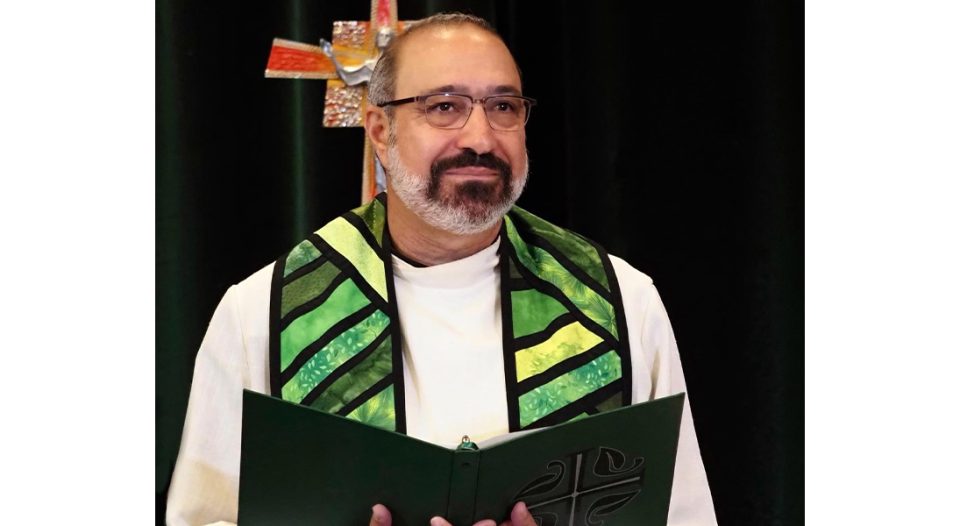Khader El-Yateem is practiced in bridge-building. As pastor of Salam Arabic Lutheran Church in New York City—a congregation he started as a mission developer in 1995 and at which he preached in both Arabic and English—he served as a clergy liaison to the New York Police Department and co-founded the Bay Ridge Unity Task Force, established by an interreligious group of leaders to combat bigotry in the wake of 9/11.
A native Palestinian, El-Yateem is president of the ELCA Association of Lutherans of Arab and Middle Eastern Heritage, concentrating their advocacy on connecting immigrants and refugees with church resources. He most recently served the ELCA Florida-Bahamas Synod as assistant to the bishop and director for evangelical mission.
On March 18, El-Yateem began a new role, as executive director of the Service and Justice home area in the ELCA churchwide organization. Living Lutheran spoke with him about his background in relationship-building and how it informs his vision for Service and Justice.
Living Lutheran: What do you see as the top priorities for the Service and Justice home area?
El-Yateem: To reclaim ourselves as the church. We are not a social service agency, we are not a granting organization. We are the church that Christ has called to be in the world today and to live according to our Lutheran understanding of the gospel and Lutheran traditions by engaging others with the message of the gospel.
So my top priority is that everything we do and everything we commit ourselves to has to contribute to two things: how we are lifting up the idea of evangelization and how we are making disciples. Yes, people are hungry, they want to eat. But they also deserve to hear the message of the gospel. And people who are suffering from injustice, people who are dehumanized, people who are dealing with natural disasters or human-made disasters, as we respond to their needs, they also need to be reminded that God loves them, God cares about them.
We are not a social service agency, we are not a granting organization. We are the church.
Our relationship with the world has to not be a transactional relationship based on finances because we have money, but it has to be based on building relationships, sharing the gospel and bringing this sense of peace, sense of joy, sense of comfort and healing and reconciliation to a broken world. And that’s what I hope that my team will commit to do as we bring our many diverse programs, that we continue to lift the message of the gospel as our central mission of engagement with others.
How can ELCA members and congregations get more involved with that work?
We need to look in our community. What are the issues that really impact the people in our communities? How are we responding? How are we organizing? How are we speaking to our elected officials? How are we organizing with other churches and nonprofit organizations so those in our communities who need help are being supported and helped?
We need to continue to lift up how we are connected to God as a faith community. How are we being the church in the world today? How are we connected to each other as the body of Christ? How are we connected to the world and to our neighborhoods as we become the difference-makers to those who are unable to make a difference for themselves because of systems of oppression?
The gospel message is an invitation to step out of our comfort zones and to go to the places where we desperately need to be the light of Christ, to be the salt of the earth, to make the difference and to bring a sense of justice and hope for people in our communities.
As you begin this role, what are you most excited by and what do you feel will be some of the biggest challenges?
I am excited about the opportunity to bring the idea of community engagement and connecting our churches back to our neighborhoods, so we can lead with purpose as we embrace our communities and can be the true reflection, when we gather on Sunday morning, of the community that is around the church.
I think there are major challenges in terms of how we continue to engage and how we continue to incorporate and build relationships and bridges with other denominations but also with our interfaith partners. The world has proven that we need to work more to stand together, not only in times of peace but in times of war. How can we, as Christian, Muslim, Jewish and other religious leaders, stand together with our community members to address issues of injustice such as wars or systems of dehumanization?
The gospel message is an invitation to step out of our comfort zones.
We have a huge moral responsibility to stand together and to allow our faith narratives to bring us together, especially in these difficult, hard times. And instead of being divided and pointing fingers at each other, we need to be able to find a path forward, to walk together to bring a sense of justice, peace and hope, especially to people who are unable to defend themselves.
How do you think people can come together for a shared cause during such a divided time?
Sixty-five percent of Americans [say they are exhausted by politics due to] polarization, and that’s impacting family relationships, friendships, church relationships. There are churches that I know got divided because they’re hearing the message of the gospel through different filters. So polarization is playing a major role in dividing our society and dividing us. And we as a church allow it to happen, oftentimes by not taking a major stand on the message of the gospel and acting in love towards our neighbor.
Where we are, we need to start thinking strategically about how we are feeling the pain of the other, how we are experiencing the pain of the other and how we are allowing ourselves to step into the shoes of the other so we can understand their reality and where they are coming from. The danger is that we don’t want to be inclusive [in a way] that we become exclusive. The question is how we are moving together, knowing there are major differences in political views, religious views, personal views.
In your experiences with building bridges between communities, how has that moving together happened?
If we are going to focus on the negative and what divides us, there’s plenty there. But for me as a person of faith, I always look for, what are the commonalities? What is the common ground on which we can stand to be a voice of reason, and to address the issues of injustice, and to serve and love our neighbor?
We need to start thinking strategically about how we are feeling the pain of the other.
I, always in my ministry, reached out to my Jewish and Muslim neighbors, and we came together and tried to organize together. And we knew it was oftentimes difficult. I always say, when somebody sneezes in the Middle East, we catch a cold here in this country. That’s true today, and it’s impacting our relationships. Wartime becomes the moral compass which exposes our reality in a way that’s either demeaning or affirming of our work together. And I hope that the moral compass of what’s happening in these areas of conflict will show that we are more united, we are more willing to stand together and take the risk, instead of being divided and drifting to the side of polarization.
What motivates you personally in your ministry and the roles you’ve served in?
My drive and my hope is my faith story. Growing up in Palestine, I lived all my life under the Israeli occupation. I was a political prisoner, and that’s really where I had experienced for the first time and knew God. I knew a lot about God, but I did not know God. In prison I knew God. And I knew God in the image of my enemy, which was the Israeli soldier who guarded my cell. Through conversation with him and through God’s interaction through him and me, I discovered God’s might, love and power for me in prison.
It’s a long story, but what I’m trying to say is my faith story—my relationship to God, the way I have encountered God in the most difficult times of my life—that’s what gives me the hope, the motivation, the drive to do what I do. And I hope that I can empower the Service and Justice home area, based on our faith commitments, to continue to engage with our neighbors and to respond faithfully to the needs of the world.
What are your primary takeaways as you’ve begun this work?
One of the greatest joys for me as a member of the Evangelical Lutheran Church in America is our willingness to engage and participate and be present around the world to accompany so many different churches. But it cannot be a one-way relationship; it has to be a two-way relationship. … Our partners and companions have so much to offer us, and we need to be open to the opportunity to learn from them, especially when it comes to how they do evangelism, how they are making disciples, how they are being the church, and the way they show up in the world. There’s so much we can learn.
And I am so deeply grateful to the members of the Service and Justice home area for the passion, the gifts and the commitment they bring. It has been inspiring to see them in action and engagement with their companion relationships and the world. It’s beautiful. We are a blessed church that is really doing amazing work as we live our faith in the world.





